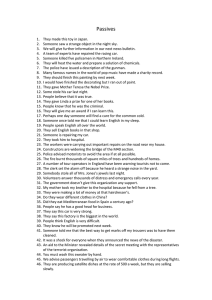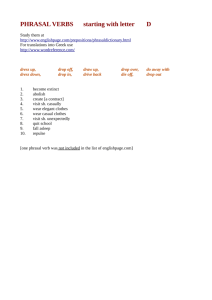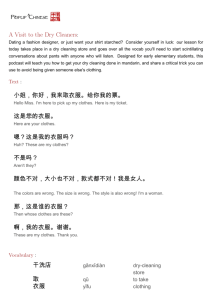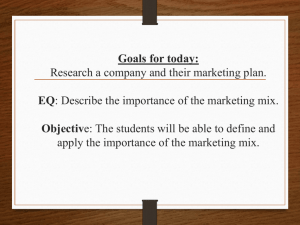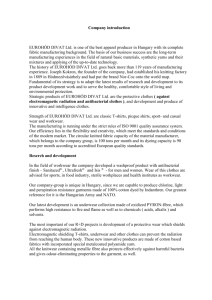READING & WRITING Read what three teenagers say about the
advertisement
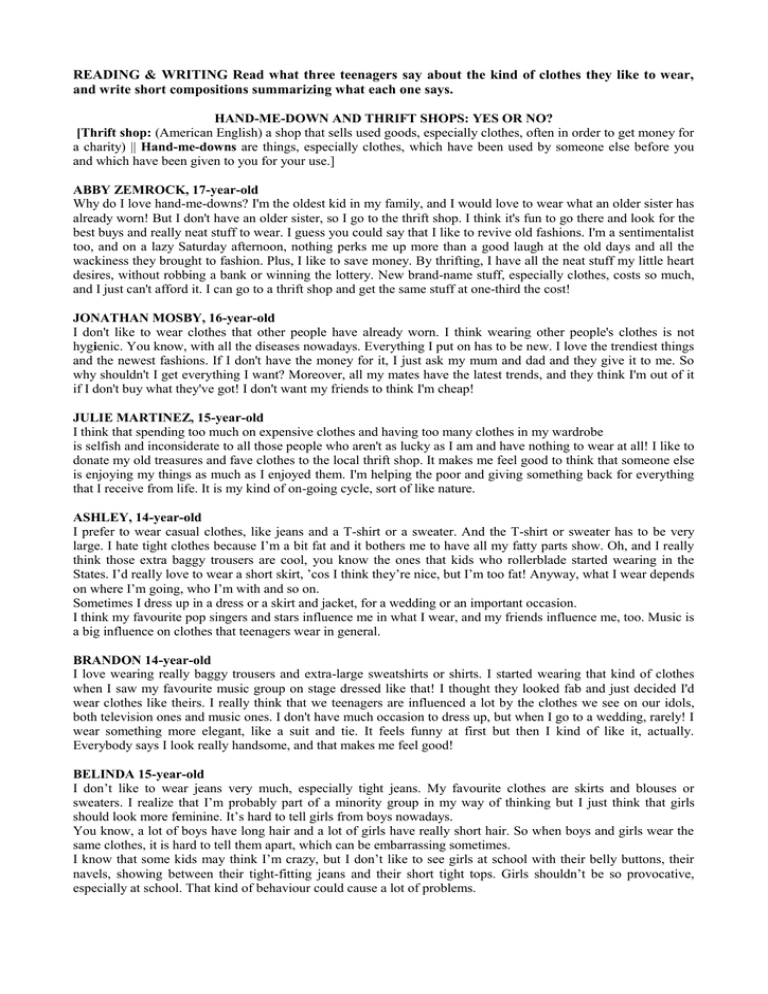
READING & WRITING Read what three teenagers say about the kind of clothes they like to wear, and write short compositions summarizing what each one says. HAND-ME-DOWN AND THRIFT SHOPS: YES OR NO? [Thrift shop: (American English) a shop that sells used goods, especially clothes, often in order to get money for a charity) || Hand-me-downs are things, especially clothes, which have been used by someone else before you and which have been given to you for your use.] ABBY ZEMROCK, 17-year-old Why do I love hand-me-downs? I'm the oldest kid in my family, and I would love to wear what an older sister has already worn! But I don't have an older sister, so I go to the thrift shop. I think it's fun to go there and look for the best buys and really neat stuff to wear. I guess you could say that I like to revive old fashions. I'm a sentimentalist too, and on a lazy Saturday afternoon, nothing perks me up more than a good laugh at the old days and all the wackiness they brought to fashion. Plus, I like to save money. By thrifting, I have all the neat stuff my little heart desires, without robbing a bank or winning the lottery. New brand-name stuff, especially clothes, costs so much, and I just can't afford it. I can go to a thrift shop and get the same stuff at one-third the cost! JONATHAN MOSBY, 16-year-old I don't like to wear clothes that other people have already worn. I think wearing other people's clothes is not hygienic. You know, with all the diseases nowadays. Everything I put on has to be new. I love the trendiest things and the newest fashions. If I don't have the money for it, I just ask my mum and dad and they give it to me. So why shouldn't I get everything I want? Moreover, all my mates have the latest trends, and they think I'm out of it if I don't buy what they've got! I don't want my friends to think I'm cheap! JULIE MARTINEZ, 15-year-old I think that spending too much on expensive clothes and having too many clothes in my wardrobe is selfish and inconsiderate to all those people who aren't as lucky as I am and have nothing to wear at all! I like to donate my old treasures and fave clothes to the local thrift shop. It makes me feel good to think that someone else is enjoying my things as much as I enjoyed them. I'm helping the poor and giving something back for everything that I receive from life. It is my kind of on-going cycle, sort of like nature. ASHLEY, 14-year-old I prefer to wear casual clothes, like jeans and a T-shirt or a sweater. And the T-shirt or sweater has to be very large. I hate tight clothes because I’m a bit fat and it bothers me to have all my fatty parts show. Oh, and I really think those extra baggy trousers are cool, you know the ones that kids who rollerblade started wearing in the States. I’d really love to wear a short skirt, ’cos I think they’re nice, but I’m too fat! Anyway, what I wear depends on where I’m going, who I’m with and so on. Sometimes I dress up in a dress or a skirt and jacket, for a wedding or an important occasion. I think my favourite pop singers and stars influence me in what I wear, and my friends influence me, too. Music is a big influence on clothes that teenagers wear in general. BRANDON 14-year-old I love wearing really baggy trousers and extra-large sweatshirts or shirts. I started wearing that kind of clothes when I saw my favourite music group on stage dressed like that! I thought they looked fab and just decided I'd wear clothes like theirs. I really think that we teenagers are influenced a lot by the clothes we see on our idols, both television ones and music ones. I don't have much occasion to dress up, but when I go to a wedding, rarely! I wear something more elegant, like a suit and tie. It feels funny at first but then I kind of like it, actually. Everybody says I look really handsome, and that makes me feel good! BELINDA 15-year-old I don’t like to wear jeans very much, especially tight jeans. My favourite clothes are skirts and blouses or sweaters. I realize that I’m probably part of a minority group in my way of thinking but I just think that girls should look more feminine. It’s hard to tell girls from boys nowadays. You know, a lot of boys have long hair and a lot of girls have really short hair. So when boys and girls wear the same clothes, it is hard to tell them apart, which can be embarrassing sometimes. I know that some kids may think I’m crazy, but I don’t like to see girls at school with their belly buttons, their navels, showing between their tight-fitting jeans and their short tight tops. Girls shouldn’t be so provocative, especially at school. That kind of behaviour could cause a lot of problems. “Music is the universal language of mankind” Music is a universal language, a diverse, vibrant force essential to the human spirit. Music encourages self-expression, creativity, and individuality as well as community. Music can mirror our cultures and times, while affecting our moods. It can create indescribable feelings. When you hear a certain song on the radio, it may bring back memories of a special and unique time in your life, a great day with your best friends, a first love, graduation, or loss. Music can become like a scrapbook [album] or collage of your life. You can communicate your thoughts and feelings through music sometimes more effectively than through words, especially with someone from another country. Research shows that music can have numerous benefits. Learning to play an instrument can enhance concentration, memory, and coordination. Some studies show that listening to Mozart can help you focus, relax, and even energize. If you need some energy, you can listen to hip-hop, or if you want a little creative spark, you can listen to jazz. The main point is to appreciate and especially enjoy the music for your mind, body, and spirit. Henry Wadsworth Longfellow – American Poet (1807 – 1882) Music by Amy Lowell 1 The neighbour sits in his window and plays the flute. 2 From my bed I can hear him, 3 And the round notes flutter and tap about the room, 4 And hit against each other, 5 Blurring to unexpected chords 6 It is very beautiful, 7 With the little flute-notes all about me, 8 In the darkness. 9 In the daytime, 10 The neighbour eats bread and onions with one hand 11 And copies music with the other. 12 He is fat and has a bald head, 13 So I do not look at him, 14 But run quickly past his window. 15 There is always the sky to look at, 16 Or the water in the well! 17 But when night comes and he plays his flute, 18 I think of him as a young man, 19 With gold seals hanging from his watch, 20 And a blue coat with silver buttons. 21 As I lie in my bed 22 The flute-notes push against my ears and lips, 23 And I go to sleep, dreaming. EX 1 Read the poem and try to answer these questions. 1. What is the mood or feeling of the first stanza (lines 1 through 8)? 2. What is the mood or feeling of the second stanza (lines 9 through 16)? 3. What is the poet saying in the last three lines of the poem? 4. Amy Lowell is called an "imagist" poet. What images, or pictures, does she create in this poem? Note on Amy Lowell Amy Lowell (l874 -1925) was an American poet and critic. She is best known for Sword Blades and Poppy Seeds, which was published in 1914. Amy Lowell became the leader of the Imagist school. This was a group of English and American poets writing from 1909 to about 1917, who were united by their revolt against the exuberant imagery and diffuse sentimentality of 19th-century poetry. Influenced by classicism, Chinese and Japanese poetry, and the French symbolists, the imagists stated that poetic ideas are best expressed by the actual rendering of concrete images without superfluous commentary. They held that poets must embody their feelings in specific physical analogies that exactly convey their meaning. The poet must produce a hard, clear, concentrated poetry, free of stilted [artificially formal] and artificial vocabulary, meter, and imagery. In its revival of the clarity and conciseness of classical poetry and in its general liberating effect on literature, imagism was an important influence on 20th-century poetry.
